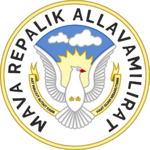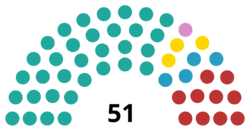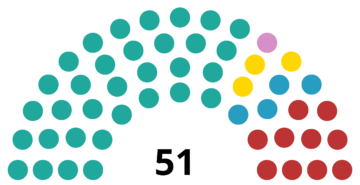National Congress of Mava: Difference between revisions
No edit summary |
|||
| (31 intermediate revisions by the same user not shown) | |||
| Line 1: | Line 1: | ||
{{Infobox legislature | {{Infobox legislature | ||
| | | name = National Congress of Mava | ||
| | | native_name = ''Mava Matinitanni Najaumiit''<br>''Congreso Nacional de Mava'' | ||
| | | native_name_lang = | ||
| legislature | | transcription_name = | ||
| coa_pic | | legislature = 11th Congress of the Republic | ||
| coa_res | | coa_pic = Seal_of_Mava.png | ||
| coa_alt | | coa_res = 150px | ||
| coa_caption | | coa_alt = | ||
| logo_pic | | coa_caption = | ||
| logo_res | | logo_pic = | ||
| logo_alt | | logo_res = | ||
| logo_caption | | logo_alt = | ||
| house_type | | logo_caption = | ||
| leader3_type | | house_type = Unicameral | ||
| leader3 | | houses = | ||
| party3 | | chambers = | ||
| election3 | | body = | ||
| | | jurisdiction = | ||
| term_limits = | |||
| structure1 | | foundation = 1 March 1970<br>8 June 1965 (as the Transitional Congress) | ||
| structure1_res | | disbanded = <!-- {{End date|YYYY|MM|DD}} --> | ||
| structure1_alt | | preceded_by = | ||
| political_groups1 | | succeeded_by = | ||
| committees1 | | new_session = | ||
| committees2 | | affiliations = | ||
| joint_committees | | leader1_type = Speaker | ||
| voting_system1 | | leader1 = Taama Iativut | ||
| last_election2 | | leader1_term = since 20 July 2020 | ||
| next_election2 | | party1 = KNM | ||
| session_room | | election1 = | ||
| session_res | | leader2_type = | ||
| session_alt | | leader2 = | ||
| meeting_place | | party2 = | ||
| | | election2 = | ||
| leader2_term = | |||
| | | leader3_type = | ||
| | | leader3 = | ||
| party3 = | |||
| election3 = | |||
| leader3_term = | |||
| leader4_type = | |||
| leader4 = | |||
| party4 = | |||
| election4 = | |||
| leader4_term = | |||
| leader5_type = | |||
| leader5 = | |||
| party5 = | |||
| election5 = | |||
| leader5_term = | |||
| leader6_type = | |||
| leader6 = | |||
| party6 = | |||
| election6 = | |||
| leader6_term = | |||
| leader7_type = <!-- up to | leader10_type = --> | |||
| leader7 = <!-- up to | leader10 = --> | |||
| party7 = <!-- up to | party10 = --> | |||
| election7 = <!-- up to | election10 = --> | |||
| leader7_term = <!-- up to | leader10_term = --> | |||
| seats = 51 | |||
| structure1 = File:Congress of Mava 2020.png | |||
| structure1_res = 250px | |||
| structure1_alt = Current composition of the Congress of Mava | |||
| structure2 = | |||
| structure2_res = | |||
| structure2_alt = | |||
| house1 = | |||
| political_groups1 = '''Government (33)''' | |||
*{{colorbox|#20a89d|border=darkgray}} Mavean National Party (33) | |||
'''Opposition (18)''' | |||
*{{colorbox|#bb3333|border=darkgray}} Democratic People's Party (10) | |||
*{{colorbox|#289dc2|border=darkgray}} Social Democratic Party (4) | |||
*{{colorbox|#d790c7|border=darkgray}} Human Rights Alliance (1) | |||
'''Unaligned (3)''' | |||
*{{colorbox|#ffd600|border=darkgray}} Lati Party (3) | |||
| committees1 = | |||
| house2 = | |||
| political_groups2 = | |||
| committees2 = | |||
| joint_committees = | |||
| term_length = | |||
| authority = | |||
| salary = | |||
| seats1_title = | |||
| seats1 = | |||
| seats2_title = | |||
| seats2 = | |||
| seats3_title = | |||
| seats3 = | |||
| seats4_title = | |||
| seats4 = | |||
| seats5_title = | |||
| seats5 = | |||
| seats6_title = | |||
| seats6 = | |||
| seats7_title = | |||
| seats7 = | |||
| seats8_title = <!-- up to | seats10_title = --> | |||
| seats8 = <!-- up to | seats10 = --> | |||
| voting_system1 = First-past-the-post | |||
| voting_system2 = | |||
| first_election1 = | |||
| first_election2 = | |||
| first_election3 = | |||
| last_election1 = 9 July 2020 | |||
| last_election2 = | |||
| last_election3 = | |||
| next_election1 = By 12 July 2025 | |||
| next_election2 = | |||
| next_election3 = | |||
| redistricting = | |||
| motto = | |||
| session_room = | |||
| session_res = | |||
| session_alt = | |||
| meeting_place = Palasi Matinitanni, Taalan | |||
| session_room2 = | |||
| session_res2 = | |||
| session_alt2 = | |||
| meeting_place2 = | |||
| session_room3 = | |||
| session_res3 = | |||
| session_alt3 = | |||
| meeting_place3 = | |||
| website = www.matinitanni.mv | |||
| constitution = | |||
| rules = | |||
| footnotes = | |||
| module = <!-- Used to embed other templates --> | |||
}} | }} | ||
The '''National''' '''Congress of Mava''' (Mavean: ''Mava Repalik Aituniajiin Matinitanni Najaumiit''; Almagrian: ''Congreso Nacional de la República Sostenible de Mava''; colloqually "Matinumiit") is the parliament of the [[Mava|Sustainable Republic of Mava]]. A unicameral legislature, its 51 members are elected every five years by first-past-the-post to represent single-member constituencies. | |||
'''Mava | |||
The | The National Congress was established on independence in 1970, succeeding the Transitional Congress that Atitlanese colonial authorities established in 1965 to prepare for independence. Congress is presided over by the Speaker (Taama Iativut since 20 July 2020), who is elected by deputies from amongst their number. Congress meets at the Palasi Matinitanni in Taalan, previously the residence of the Governor of Mava. The last election was held on 9 July 2020, with deputies meeting for the first time on 20 July 2020. | ||
== | == Election and composition == | ||
The Mava | The National Congress of Mava has 51 members (deputies) who are directly elected every five years (or before in the case of an early election). All deputies are elected via first-past-the-post in single-member constituencies. Constituency boundaries are determined by the Democracy, Boundary, and Elections Commission and approved by Congress. In addition, there are a number of individuals who may attend and speak, but who may not vote. These are the Catholic Archbishop of Taalan, the Moderator of the Presbyterian Church of Mava, the Lutheran Bishop of Mava, former Presidents who no longer serve as deputies, and provincial governors. | ||
Generally, eligibility to vote is the same as eligibility to stand for election. However, candidates may not be bankrupt and must be proficient in Mavean or Almagrian. Since 2009, a deputy can be recalled if 10 percent of constituents sign a petition. | |||
For registration purposes, political parties are allocated a status based on their position. The governing party is officially recognised as the Government, with the largest party not in government is registered as the Official Opposition. Government and, to a lesser extent, Official Opposition parties have access to state papers and official secrets. Other political groups sit as Opposition parties. Those parties in an alliance with the government but not in a formal coalition sit as Unaligned. | |||
== Party standings == | |||
{| class="wikitable" | |||
! colspan="2" | Affiliation | |||
! Party leader | |||
! Status | |||
! Members | |||
|- | |||
! style="color:inherit;background:#20a89d;"| | |||
| align=left|Mavean National Party | |||
| align=center|Juu Kajusit | |||
| align=center|Government | |||
| align=center|33 | |||
|- | |||
! style="color:inherit;background:#bb3333;"| | |||
| align=left|Democratic People's Party | |||
| align=center|Aitor Simit | |||
| align=center|Official Opposition | |||
| align=center|10 | |||
|- | |||
! style="color:inherit;background:#289dc2;"| | |||
| align=left|Social Democratic Party | |||
| align=center|Jaani Sallent | |||
| align=center|Opposition | |||
| align=center|4 | |||
|- | |||
! style="color:inherit;background:#ffd600;"| | |||
| align=left|Lati Party | |||
| align=center|Niku Pialiik | |||
| align=center|Unaligned | |||
| align=center|3 | |||
|- | |||
! style="color:inherit;background:#d790c7;"| | |||
| align=left|Human Rights Alliance | |||
| align=center|Unai Aatams | |||
| align=center|Opposition | |||
| align=center|1 | |||
|- | |||
! colspan="4" style="text-align:left; | Total | |||
| align=center|51 | |||
|- | |||
! colspan="4" style="text-align:left; | Government majority | |||
| align=center|19 | |||
|} | |||
== | == History == | ||
Mava has had a legislature since June 1965, when the Transitional Congress (Mavean: ''Matinitanni Anuusijinijiin'') was established by the Atitlanese government to prepare the islands for independence. Initially, the congress was not directly elected, instead composed of the leading members of the indigenous Mavean National Committee for Political Change (GAKNM). The first election, in July 1966, saw only members of GAKNM eligible to vote and stand as candidates, largely disenfranchising all non-indigenous Maveans. | |||
On independence in March 1970, the Transitional Congress became the permanent Congress of the Republic, the legislature of the new country. In 1997, the name was officially changed to the National Congress of the Sustainable Republic of Mava following the adoption of a new constitution. | |||
== List of speakers == | |||
* Piaate Salikaami (1 March 1970 - 7 June 1985) | |||
* Kaatipit Raamput (17 July 1985 - 8 June 1990) | |||
* Sitivaan Puraam (18 July 1990 - 13 June 1997) | |||
* Uilpavasi Kalapuan (14 July 1997 - 5 May 2004) | |||
* Kaatipit Iapiim (10 May 2004 - 5 June 2015) | |||
* Suuli Kuaas (13 July 2015 - 5 June 2020) | |||
* Taama Iativut (20 July 2020 - present) | |||
== | ==Last election== | ||
{{Election results | |||
|image=[[File:Congress of Mava 2020.png|360px]] | |||
|party1=Mavean National Party|votes1=8049|seats1=33|sc1=-1|color1=#20a89d | |||
|party2=Democratic People's Party|votes2=6981|seats2=10|sc2=+1|color2=#bb3333 | |||
|party3=Social Democratic Party|votes3=4783|seats3=4|sc3=0|color3=#289dc2 | |||
== | |party4=Lati Party|votes4=532|seats4=3|sc4=+1|color4=#ffd600 | ||
|party5=Human Rights Alliance|votes5=2784|seats5=1|sc5=-1|color5=#d790c7 | |||
|total_sc=0 | |||
|valid=22227 | |||
|invalid=902 | |||
|electorate=26077 | |||
|source=National Congress of Mava | |||
}} | |||
==See also== | ==See also== | ||
* [[ | *[[Mava]] | ||
* | *[[Politics of Mava]] | ||
*[[President of Mava]] | |||
* [ | |||
{{Elezia}} | {{Elezia}} | ||
[[Category:Mava]] | [[Category:Mava]] | ||
Revision as of 14:14, 7 January 2025
The National Congress of Mava (Mavean: Mava Repalik Aituniajiin Matinitanni Najaumiit; Almagrian: Congreso Nacional de la República Sostenible de Mava; colloqually "Matinumiit") is the parliament of the Sustainable Republic of Mava. A unicameral legislature, its 51 members are elected every five years by first-past-the-post to represent single-member constituencies.
The National Congress was established on independence in 1970, succeeding the Transitional Congress that Atitlanese colonial authorities established in 1965 to prepare for independence. Congress is presided over by the Speaker (Taama Iativut since 20 July 2020), who is elected by deputies from amongst their number. Congress meets at the Palasi Matinitanni in Taalan, previously the residence of the Governor of Mava. The last election was held on 9 July 2020, with deputies meeting for the first time on 20 July 2020.
Election and composition
The National Congress of Mava has 51 members (deputies) who are directly elected every five years (or before in the case of an early election). All deputies are elected via first-past-the-post in single-member constituencies. Constituency boundaries are determined by the Democracy, Boundary, and Elections Commission and approved by Congress. In addition, there are a number of individuals who may attend and speak, but who may not vote. These are the Catholic Archbishop of Taalan, the Moderator of the Presbyterian Church of Mava, the Lutheran Bishop of Mava, former Presidents who no longer serve as deputies, and provincial governors.
Generally, eligibility to vote is the same as eligibility to stand for election. However, candidates may not be bankrupt and must be proficient in Mavean or Almagrian. Since 2009, a deputy can be recalled if 10 percent of constituents sign a petition.
For registration purposes, political parties are allocated a status based on their position. The governing party is officially recognised as the Government, with the largest party not in government is registered as the Official Opposition. Government and, to a lesser extent, Official Opposition parties have access to state papers and official secrets. Other political groups sit as Opposition parties. Those parties in an alliance with the government but not in a formal coalition sit as Unaligned.
Party standings
| Affiliation | Party leader | Status | Members | |
|---|---|---|---|---|
| Mavean National Party | Juu Kajusit | Government | 33 | |
| Democratic People's Party | Aitor Simit | Official Opposition | 10 | |
| Social Democratic Party | Jaani Sallent | Opposition | 4 | |
| Lati Party | Niku Pialiik | Unaligned | 3 | |
| Human Rights Alliance | Unai Aatams | Opposition | 1 | |
| Total | 51 | |||
| Government majority | 19 | |||
History
Mava has had a legislature since June 1965, when the Transitional Congress (Mavean: Matinitanni Anuusijinijiin) was established by the Atitlanese government to prepare the islands for independence. Initially, the congress was not directly elected, instead composed of the leading members of the indigenous Mavean National Committee for Political Change (GAKNM). The first election, in July 1966, saw only members of GAKNM eligible to vote and stand as candidates, largely disenfranchising all non-indigenous Maveans.
On independence in March 1970, the Transitional Congress became the permanent Congress of the Republic, the legislature of the new country. In 1997, the name was officially changed to the National Congress of the Sustainable Republic of Mava following the adoption of a new constitution.
List of speakers
- Piaate Salikaami (1 March 1970 - 7 June 1985)
- Kaatipit Raamput (17 July 1985 - 8 June 1990)
- Sitivaan Puraam (18 July 1990 - 13 June 1997)
- Uilpavasi Kalapuan (14 July 1997 - 5 May 2004)
- Kaatipit Iapiim (10 May 2004 - 5 June 2015)
- Suuli Kuaas (13 July 2015 - 5 June 2020)
- Taama Iativut (20 July 2020 - present)


